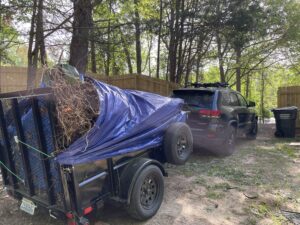 During our 24 years of marriage, I never negotiated with the tradespeople who came to our house – the electricians, plumbers, septic guys, realtors. It was my husband, Jay, who spoke to them. I was polite, smiled, shook hands, signed things when needed. It just worked better that way. His presence said something that mine could not. It said, “Do a good job, or else.” And they always did. His existence in our home, on the property, standing there in the space of a tradesperson negotiating a deal – it kept people honest, which is peculiar because I never recognized it when he was alive.
During our 24 years of marriage, I never negotiated with the tradespeople who came to our house – the electricians, plumbers, septic guys, realtors. It was my husband, Jay, who spoke to them. I was polite, smiled, shook hands, signed things when needed. It just worked better that way. His presence said something that mine could not. It said, “Do a good job, or else.” And they always did. His existence in our home, on the property, standing there in the space of a tradesperson negotiating a deal – it kept people honest, which is peculiar because I never recognized it when he was alive.
I only feel its absence now at the intersection of widowhood, a hard shift yanking me into the lane of single female and single parent. Within the first year of losing him, I navigated a 75% income loss, economic strain, relocation, home repairs, a massive career shift, loss of healthcare, and a giant influx of sexism, ostracism from friends who disagreed with my decisions, and of course, grief itself: the ache in my gut that never leaves, the incessant screeching in my head, and the pain I carry for my children’s grief.
Even now, five years into things, I toggle between unstoppable and hopeless. To the world I am seemingly doing well – but I struggle, especially when someone has taken advantage of my lack of expertise. It’s been one learning curve after the next, and I find myself quite frequently on the floor of my shower, mumbling to God, staring at the tiles until the water runs cold.
Last year, a plumber quoted me $14k for an issue — a sulfur smell on the cold side of my bathroom faucet. After two additional quotes, ranging from $2500-$7000, I learned from a fourth plumber that I could fix the issue myself. I just needed to buy new faucet hoses, the ones that go under the sink. Cost me $15 bucks.
A well technician charged me $7000 for a pressure tank, which broke within a year. A different well technician replaced it for $900 and told me the other folks were crooks. An electrician once told me my entire house was wired incorrectly. He would need to replace my entire fuse box ($7800). A different electrician simply tightened the wires on the dining room light that was flickering and popping.
I had to get smarter, in a lot of areas. That was for sure, and I had to do it while navigating the shift of grief: I’m still trying to catch up on my career after years of prioritizing raising a family, but little by little, things are coming along. I’m learning how to do, what I call, “the man things.” I spend a lot of time on YouTube watching videos about how to fix stuff around my house. There is still grief of course. I still have that ache in my gut, but the screeching voice in my head has lessened. I still have “widow brain” – a lovely grief condition where you forget everything you once knew, including basic words sometimes – and I google more things now than I ever have before. I lose my car in parking lots and forget why I came to the store. It’s who I am now, but that’s okay.
When Jay first died, my mother urged me to write, but I couldn’t think of any words to express what was happening on the inside of me, so, I couldn’t compose much beyond a simple independent clause: ‘I am sad. This sucks. My chest hurts.’
Here in the fifth year, the words are starting to flow again, so I let them, and call it healing.
I can also do a lot of things now: I can load, shoot, and clean my gun. I can safely remove a copperhead from my backyard and climb a forty-foot ladder to save my cat that’s been howling for three days. I can replace the brake lights in my car and rewire my trailer. I can switch out the lawnmower blade, flip the dryer door from left-swinging to right-swinging, replace a light switch, install an outlet, repair drywall and vinyl plank flooring. I can swing an ax, operate a reciprocating saw, run a chainsaw, properly load a landscape trailer — and back that baby up like a boss. It’s a strange place to be. I have become surprisingly capable, which men don’t seem to appreciate, but that’s okay, because I like who I am, this incredible product of grief.
As for the things I need help with — I’ve developed a few rules to safeguard myself from unethical technicians:
- I should do about two days of research before engaging in conversation with tradespeople. It’s important to be able to speak their language. It sends them a message, ‘I know stuff about what you’re saying.’
- I should get at least three quotes, if I have time to schedule three quotes. I try to schedule them on the same day, at the same time, so they are aware of the competition.
- I need to follow them around during their initial assessments, take pictures, take notes, read every single line of the contract, and be prepared to be their project manager, check every single step of their progress with more pictures, follow-up emails, and reminders about timelines and cost. It has earned me the title of “Karen,” but I don’t care.
It’s not been easy, but I like this woman that I have become. I like her strength and her resilience and her tenacity. I like her new skills. I like her curiosity and boundaries, her grace and empathy for others. I like her developed capability for forgiveness. I like that she falls asleep on the couch and lets her sink fill with dishes. I like that she only sometimes brushes her hair and goes to the grocery store looking disheveled. I like that she trusts God in everything she does – I like this woman.
I think Jay would have liked her too.



I love this. As excruciatingly difficult this journey in widowhood is, I want you to know your words and actions are encouraging and beautiful. I am 2 years into this and feel the heaviness of making even the smallest of choices but am grateful for being able to make all of them – small or large. I recently grew my chicken flock and added 12 baby chicks. a new venture for me and my 6 underage children. My dad and I restarted my handyman business with my teenage sons. It is difficult but fun.
Jennifer, you sound like quite the amazing woman! It’s the support from family that helps us get through. I’m so glad your dad is there to help while you move forward with your handyman business and chicken flock. Would love to see some pics and updates. Your strength and courage are inspiring. 🙂